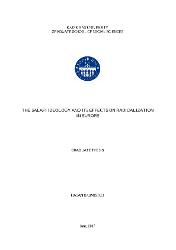| dc.contributor.advisor | Triantaphyllou, Dimitrios | en_US |
| dc.contributor.author | Başmısırlı, Hasan | |
| dc.date.accessioned | 2019-07-12T08:35:39Z | en_US |
| dc.date.available | 2019-07-12T08:35:39Z | en_US |
| dc.date.issued | 2017 | en_US |
| dc.identifier.uri | https://hdl.handle.net/20.500.12469/1923 | |
| dc.description.abstract | The radical islamist movements are on the rise across Europe. A new generation of homegrown jihadists creates an even greater challenge for European policy makers. Since the attacks of 9/11 the global war on terror may have some success in terms of conventional fighting but it seems to be failing in terms of preventing radicalization. The Salafi ideology is the main system of thinking behind many fundamentalist organizations and terror groups. The radicalization occurs as a result of the Salafi interpretation of islamic revelation and its doctrines. Despite the sheer number of studies and literature on religious radicalization few seem to be actually contributing in understanding the radical tendencies and indoctrination of the European youth by the Salafi rhetoric. Salafism is funded by the proponents of the Salafi ideology. Due to this global logistical support the Salafi mosques and religious centers are on the rise across Europe. Most European youth naturally run into these centers in order to fulfill their religious needs and naturally perceive that the Salafi interpretation of islam is the only legitimate and righteous one. This study aims to provide the necessary evidence to prove that the content of the Salafi rhetoric and the rising number of Salafi mosques are the main tools of radicalization used by Jihadists. | en_US |
| dc.description.abstract | Radikal İslamcı hareketler Avrupa genelinde bir yükseliş trendi
göstermektedir. Avrupa’da büyümüş yeni nesil jihadçılar Avrupalı politika ve kanun
koyuculara her zamankinden daha fazla meydan okumaktadır. 11 eylül saldırılarından
bu yana global terrörle mücadele ve savaş başarılı gözüksede, radikalleşmeyi önleme
açısından başarısız sonuçlar vermektedir. Bir çok köktendinci örgüt ve grubun
düşünce yapısındaki temel ideoloji Selefi düşüncedir. Radikalleşmenin kaynağı Selefi
düşüncenin İslami vahiy ve doktrinleri yorumlama biçiminden kaynaklanmaktadır.
Radikalleşme üzerine yazılmış mevcut literatür ve çalışmaların çokluğuna rağmen,
çok az araştırma genç Avrupalıların radikalleşme süreci konusunda Selefi ideolojiye
yönelmiş veya konsantre olmuştur. Selefi ideoloji Avrupa genelinde Selefi deolojiyi
benimsemiş çevreler tarafından finanse edilmektedir ve bu global lojistik desteğin bir
sonucu olarak Selefi camiler ve dini merkezler Avrupada çoğalmaktadır. Birçok genç
Avrupalı Müslüman dini ve manevi ihtiyaçlarını gidermek için bu camilere
yönelmekte, ve Selefi ideolojiyi Islamın tek meşru ve doğru yorumu zannetmektedir.
Bu çalışma Salafi ideolojinin içeriksel söyleminin ve artan Selefi dini merkezlerin
genç avrupalıları radikalleşmesi üzerine etkilerini analiz etmektedir. | en_US |
| dc.language.iso | eng | en_US |
| dc.publisher | Kadir Has Üniversitesi | en_US |
| dc.rights | info:eu-repo/semantics/openAccess | en_US |
| dc.subject | İdeolojik yonelim | en_US |
| dc.subject | Radikalleşme | en_US |
| dc.subject | Cihad | en_US |
| dc.subject | Selefilik | en_US |
| dc.subject | Wehhabilik | en_US |
| dc.subject | Selefi-Jihadçılık | en_US |
| dc.subject | Avrupa | en_US |
| dc.subject | Fransa | en_US |
| dc.subject | Birleşik Krallık | en_US |
| dc.subject | and Almanya | en_US |
| dc.subject | Radicalization | en_US |
| dc.subject | Jihad | en_US |
| dc.subject | Salafism | en_US |
| dc.subject | Wahhabism | en_US |
| dc.subject | Salafi-Jihadism | en_US |
| dc.subject | Europe | en_US |
| dc.subject | France | en_US |
| dc.subject | United Kingdom | en_US |
| dc.subject | and Germany | en_US |
| dc.title | The salafi ideology and its effects on radicalization in Europe | en_US |
| dc.type | masterThesis | en_US |
| dc.department | Enstitüler, Lisansüstü Eğitim Enstitüsü, Uluslararası İlişkiler Ana Bilim Dalı | en_US |
| dc.relation.publicationcategory | Tez | en_US |
| dc.identifier.yoktezid | 469430 | en_US |
















